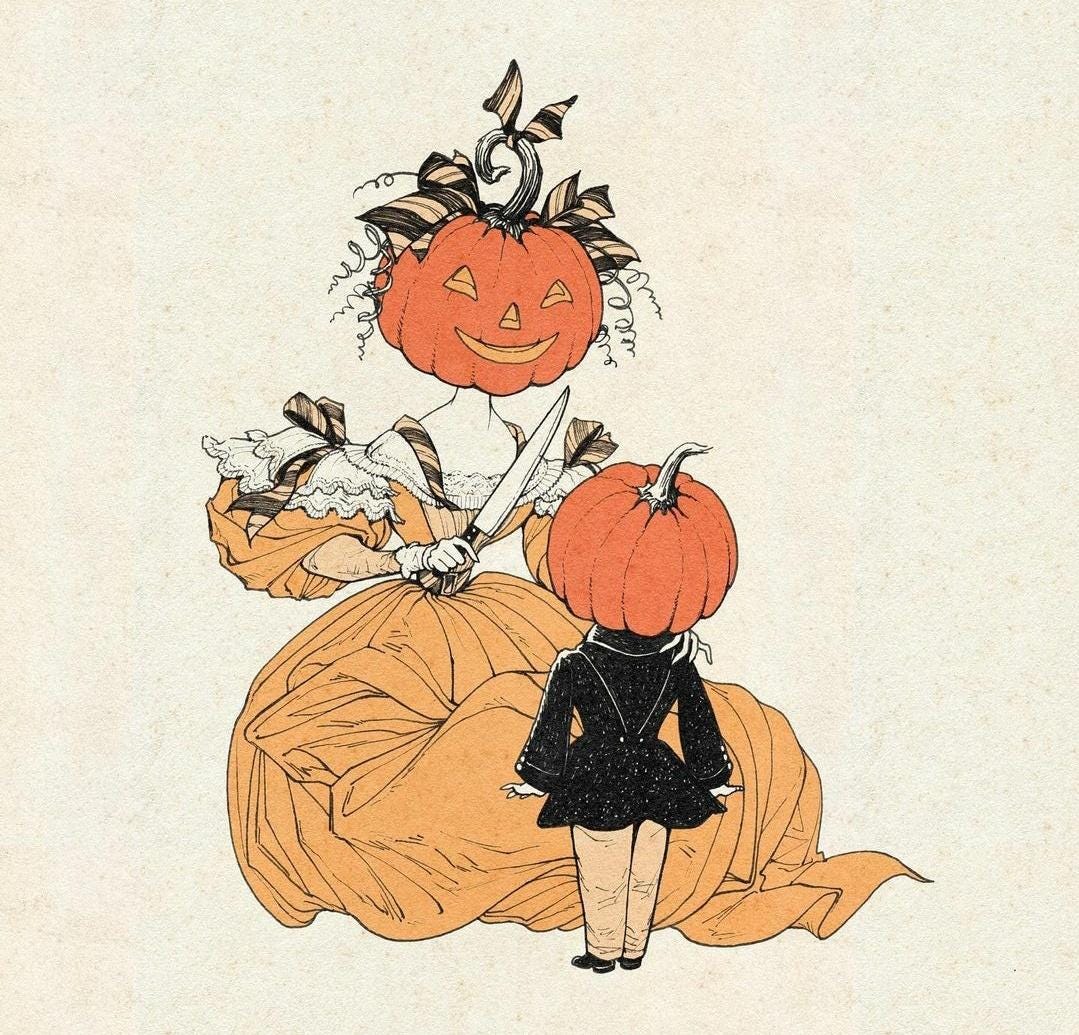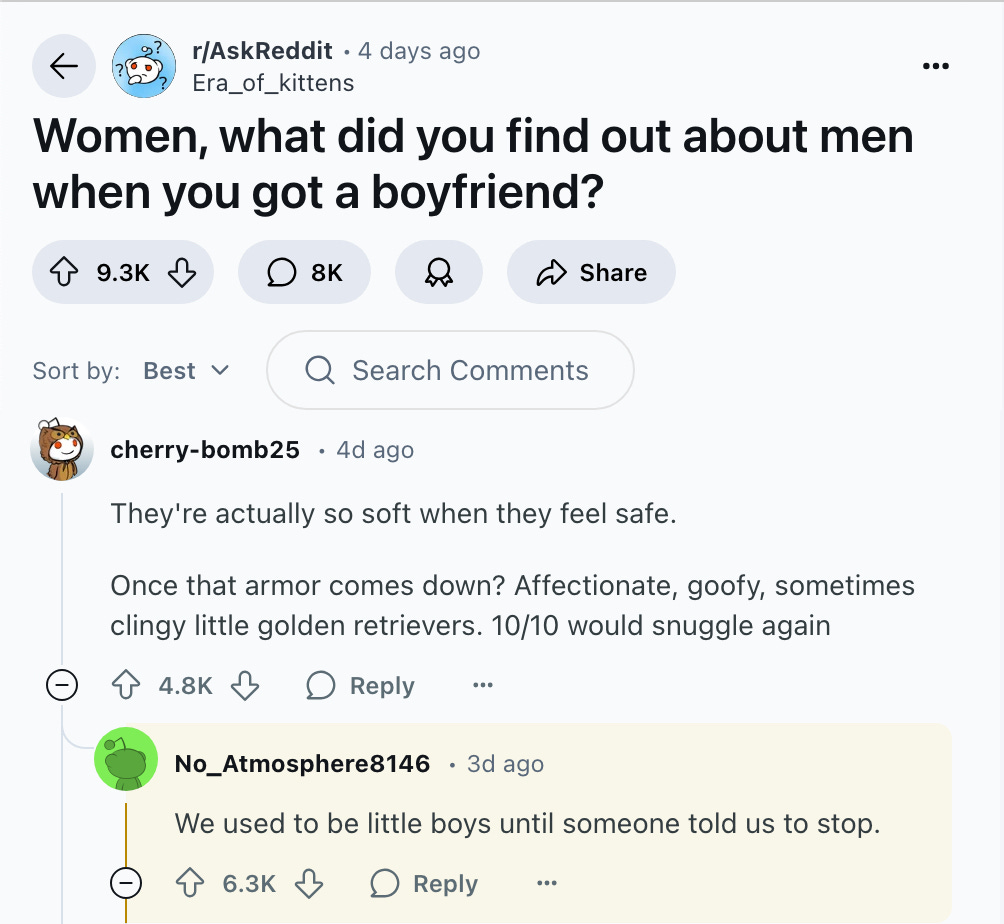A third of what I have to say about Rick and Morty
The best parts of R&M are the best show about parenting I've ever seen.
Context: Earlier this week I released a 20,000-word omnibus essay about … pessimism and optimism? …and how people end up being one or the other, and how those people end up experiencing and living in fundamentally different worlds from each other.
This was just one section in that larger piece, but it was originally going to be a standalone essay and I anticipate wanting to be able to link to it all on its own, so I’m breaking it back out. If you’ve already read Truth or Dare, nothing new in this one.
The show Rick and Morty centers on the relationship between the titular Rick Sanchez—a multiverse-hopping sociopathic genius inventor with a drinking problem—and his grandson Morty, a basically ordinary fourteen-year-old boy who he drags with him on insane adventures with dubious consent. It covers a lot of ground, and hits on a surprisingly wide range of themes, but one of the major reasons that I fell in love with it is that, for a brief and glorious moment, it was the only show on television that was making High Art out of the messy reality of parenting.
(Morty’s actual parents, Beth and Jerry, are main characters too; Beth is Rick’s daughter and has plenty of father issues; there are multiple episodes in which some version of Morty ends up a father himself. But by far the most meaningful parental relationship in the show is the one between Morty and Rick.)
There’s a deeply unsettling comic that is also about parenting, in precisely the same way, that seems like a good place to start:
Rick is in control of Morty, in the same fashion as the mother in the image above.
Not in the sense that he is, at any given moment, exercising control. Morty spends most of his minutes on the show acting more-or-less autonomously.
But Rick is the one controlling Morty’s evolution. He retains the ultimate power to shape Morty’s experience and context. He has—more than once!—dragged Morty away, not just from his friends and family, but from his entire reality, uprooting him and depositing him unceremoniously into an alternative version of his own life (usually via a method that involves making Morty literally bury the corpse of a doppelganger).
He controls whether or not Morty goes to school. He arbitrarily chooses which memories Morty is allowed to retain. He makes multiple clandestine alterations to Morty’s mind and body and DNA, virtually never with Morty’s knowledge or permission. On top of that, he also pushes Morty around in all of the normal ways—bullying, mockery, manipulation (and, begrudgingly, also flattery and admiration and genuine affection; abusers never are pure evil, or they’d be much easier to escape).
(The youth rights activist in me points out that, actually, it’s all normal, in the sense that Rick doesn’t do anything that’s fundamentally outside of the realm of what most American parents consider entirely within their prerogative. Controlling Morty’s movements, deciding which relationships he’s allowed to maintain, trespassing on his privacy and bodily autonomy, forcing him into various activities regardless of interest, subjecting him to endless propaganda and relentless emotional and psychological pressure—the science fiction setting of the show cranks it to eleven, but it’s like using robots or zombies to make a allegorical point about present-day society. In the end, Rick’s treatment of his grandson is only extreme in its magnitude, not in its core nature. I think hope that Rick and Morty is trying to draw attention to this, on purpose, though I may be giving the showrunners too much credit—it’s sometimes hard to tell the difference between a savage satirical skewer and a story written by a person who just thinks that’s what normal is.)
What makes the-parts-of-the-show-that-are-about-parenting compelling to me is that Rick clearly cannot decide what to do with the knife. To the extent that Rick and Morty is about the ongoing battle for Morty Smith’s soul, that battle is primarily being fought inside Rick. It’s Dark Rick versus (the surviving, resentful fragments of) Light Rick, and the ultimate outcome is genuinely anybody’s guess.
(Again I see this as a mere heightening of ordinary reality, rather than a departure into full-blown fantasy—most parents do not seem to me to behave coherently toward their children, in the sense of having an actual philosophy that they allow to actually constrain their actions. Rather, the biggest determinant of whether a child is about to have a good day or a bad one mostly seems to be whether the parent happens to show up as Dr. Jekyll or as Mr. Hyde.)
Rick is a nihilist. He’s also a narcissist, a hedonist, and a solipsist. He’s also suicidally depressed.
(These traits are not unrelated.)
He spends half of his time floundering in ennui, preemptively sneering at concepts like “meaning” and “purpose” and “connection” in a transparent and only-partially-successful attempt to stop himself from feeling the acute pain of their absence.
(He spends the other half idly toying with forces beyond comprehension and sometimes nurturing petty grievances into unimaginably elaborate revenge schemes.)
Morty, on the other hand, is—well, a kid. Which is to say: he is an as-yet-unruined whole and (relatively) healthy person. He has morals (if shaky ones). He has fears (where Rick has only apathy). He has loves (and lusts). He has an intact capacity for awe and wonder and curiosity, and pushes back against his grandfather’s bleak derision with the intermittent fervor of someone who’s pretty sure they’re in the right, but expects to lose the argument anyway.
“You sold a gun to a guy that kills people! Selling a gun to a hitman is the same as pulling the trigger.”
“It’s also the same as doing nothing. If Krombopulous Michael wants someone dead, there’s not a lot anyone can do to stop him. That’s why he does it for a living.”
And Rick clearly finds all of these traits infuriating, threatening, tedious, and admirable, in turn. He vacillates wildly between explicitly trying to burn them out of his grandson (and thereby forging him into Rick 2.0) and going to extreme, even self-sacrificial lengths to preserve and nurture them.
(And thereby … forging him into Rick 2.0? In a very different, yet equally valid sense.)
It’s pretty easy to see through the flimsy narrativemancy that Rick is deploying in order to justify some of his crueler manipulations—it’s the same sort of stuff that abusive parents have said since the beginning of the species. It’s a cold world out there, you’ve got to be tough to survive, you gotta learn or they’ll eat you alive, blah blah blah.
It’s also easy to see that it’s not all self-deception and rationalization. It is a cold world out there. Morty does need to be tough(er than he is) to survive. There are untold horrors in the universe of Rick and Morty, and they are in fact often trying to eat Morty alive. Throughout the course of the show, we see countless alternate-reality versions of him die in all sorts of horrifying ways, often downstream of the very traits that Rick finds so viscerally offensive.
(But A can be a valid justification for B while not being the actual reason someone is doing B. The fact that some of Rick’s abuse is incidentally useful for helping Morty grow doesn’t mean Rick is doing it in service of that growth.)
(Except that sometimes he is? The show is beautifully unwilling to oversimplify.)
And yet.
As Rick plummets into a timeless abyss, having used (essentially) the last parachute on his grandson, he murmurs to himself “be good, Morty. Be better than me.”
As Morty emerges from a bathroom, quivering and traumatized from a sudden and shocking near-miss with a rapist—
(who he had to physically fight off with a level of violence that would itself be traumatizing all on its own)
—Rick, unaware of specifics but immediately picking up on the shift in Morty’s state, suddenly switches from contempt to comfort, insisting that they finish the adventure he’s been deriding all day long, asserting that hey, the universe is a crazy and chaotic place, that’s why it’s a good thing people like you are around to clean it up every now and then.
As Morty comes back to his senses after being driven into a murderous rage, Rick lies to him, reassuring him that he was drugged, that he isn’t culpable, that the-person-he-was-being over the previous hour isn’t the real him, the real him wouldn’t do that, is better than that, wasn’t really at fault.
(Which he wasn’t, in the sense that Morty tried to avoid the inciting situation altogether, was forced into it by Rick, and only acquiesced and went along in a misguided attempt to save an innocent from an angry mob, after which things went sideways multiple times in a row until finally all of his repressed trauma was dragged to the surface.)
Being as charitable as possible to Rick, the central dilemma facing him is which parts of Morty he has to amputate and cauterize, in order to give the remainder the best possible shot at survival and happiness. Rick knows that his grandson’s softness—his kindness—his humanity—make him vulnerable.
But he also knows that those are the parts that make life worth living. He knows this intimately, because it was in losing those very same parts of himself that his own life ceased to be of value (even to him).
He’s trying to decide, in other words, just how dark of a dark world to shove Morty into. Just how dark to make Morty, under the assumption that Morty needs to be as-dark-or-darker than the environment he finds himself in, if he is to survive.
I vagueposted a couple of times about a particular piece of clothing that I like a lot, which caused a friend to double-click:
Hey Duncan, what's the significance of your cherry blossom hoodie? You mentioned it in terms that made it sound like there was Content there.
My response:
"soft"
but like, spiritually and psychologically
it represents a sort of being-allowed-to-be and embracing-of soft that is ... difficult, and a little bit alien, for a twelve-year-old boy raised in middle class 90's America, but which is in fact actually healthy and good
like “no soft allowed” being part of the toxic part of masculinity
I've only tentatively and stutteringly started practicing relaxing into softness at all in just the past few years b/c I spent the vast majority of my early life extremely armored up, because being extremely armored up was extremely necessary (world not shaped for Duncans, world is suddener than we fancy it, world is crazier and more of it than we think)
it only recently became sufficiently safe + something I even bothered trying to do + something I seriously considered rather than preemptively scoffing at
And the hoodie is a symbol of this in that, like.
“That doesn't look like something boy!Duncan would wear.”
“Why not, though?”
“..............huh.”
e.g. parts of this post from a couple years ago:
I have yet to find an explanation for hardness being superior to softness that doesn't ground out in some specific risk or danger or threat or need. Often people have a difficult time really taking seriously the hypothetical “okay, but what if that risk were really truly gone?” and they end up answering as if the risk were still obviously present, as if it fundamentally can’t be got rid of—
(and in many cases, risk is still present, despite those who try to convince you that it's not, so it makes sense for people to be sort of inoculated against the hypothetical, we’ve been lied to before)
—but I think it's basically the case that softness >>> hardness, absent those specific instrumental reasons why hardness is called for.
Like, there's a very specific kind of horror/disgust that e.g. typically masculine fathers often express when they are told to imagine their sons turning out gay/effeminate, and that horror almost always seems to ground out in something like “but but but then he'll be weak and vulnerable and he needs to be strong, because [danger] and [threat] and [risk].”
And I think this horror and disgust is sensible at its root, because the world does have [danger] and [threat] and [risk], and strength and durability and yes, even a kind of coldhearted ruthless willingness-to-do-what-must-be-done are often crucial, and individuals and groups who lack them often do suffer or die in times of crisis.
But like. That's it? As far as I can tell, tragic necessity is the only real reason to prefer hardness to softness. Like, I get that people have different preferences, and I'm sure some minority of people Just Like Hardness For Its Own Sake (and that seems totally fine).
But I think that humans en masse, given a genuinely safe environment and a genuinely free choice, overwhelmingly would rather be soft and experience softness than the opposite.
“I must study politics and war that my sons may have liberty to study mathematics and philosophy. My sons ought to study mathematics and philosophy, geography, natural history, naval architecture, navigation, commerce and agriculture in order to give their children a right to study painting, poetry, music, architecture, statuary, tapestry, and porcelain.”
Hardness is often necessary, but softness is actually good.
Rick Sanchez is a poor, battered, traumatized former little boy who had every bit of softness viciously abraded away and has spent decades welding armor directly onto his soul, and he’s agonizingly caught between wanting to save his grandson from experiencing that same pain and wanting him to just fucking get it over with. He lacks the strength and introspective capacity to even acknowledge the fact that he’s struggling with this dilemma—
(Because caring is something he supposes he is not supposed to do, because caring is a vector by which more pain happens)
—and so he just fumbles his way forward, half-conscious and incoherent, in haphazard and self-sabotaging dialogue with his own envy and loss and regret, motivated just as much by [infantile tantrums] and [a total lack of self-control and perspective] as he is by [a genuine desire for Morty’s well-being]. He has reasons for being strategically cruel to Morty, and he has reasons for being protective, and he’s also just a broken and randomly abusive patriarch, it’s not like he’s doing any of this in anything like a consistent or principled manner, it’s all an absolute mess of overkill and overcorrection and post-hoc rationalization intermixed with searing moments of unbearable shame and self-awareness and the whole thing rings incredibly true to my sense of what “parenting” actually looks like, out there among the humans.
(It feels more honest than most depictions. Less whitewashed and anesthetized, less neatly organized. I’m so used to a show having either Good Parents or Bad Parents that it’s mesmerizing to see something that feels Real.)
And I can’t look away. It’s an exquisitely heartbreaking study of the evolution of Morty’s soul, toward someone who will either end up viewing life as an opportunity for fun and vulnerability and novelty and connection and the thrill of unscripted possibility…
…or as a lame and meaningless pantomime for babies whose existence doesn’t matter and contains nothing of value or interest in the first place.
The kicker is, Rick knows—from his own sad experience—that the parts you cauterize don’t just grow back. That the process of endarkening the soul is (mostly) a one-way ratchet. Rick knows (because he’s caught in them himself) that cynicism and nihilism are memetic traps—that once you lose your grip on the thread of meaning, it’s incredibly hard to find it again. Most of Rick desperately wants Morty to wake up to the fact that none of this matters and there’s no point to any of it (mainly so he’ll stop being so god damn annoying all of the time).
But he’s also acutely aware that, once that critical step is taken, there’s nothing left to do but kill time until the clock runs out.
And because Rick and Morty doesn’t pull its punches, what we get in response to this fundamental question is … both. Neither. Unpredictable whiplash, unrelenting ambiguity. Rick’s unstrategic flailing, and the show’s ongoing and absolute refusal to provide anything like closure or resolution or relief.
(Awfully familiar, isn’t it? Wubba lubba dub dub.)













Woah!
I love this summary of Rick and Morty's relationship
Towards the beginning, you seem to question to what degree Harmon is _aware_ of this dynamic where Morty's whole character is being shaped by Rick's moods and whims? But I don't see how he could write this show without being very explicitly aware of it.
There are a number of nods that feel very explicit and intentional:
You already pointed out the Morty's Mindblowers episode where Rick is shown to be erasing Morty's memories.
There's the episode where Morty's consciousness gets split between billions of people in a video game and they need to be re-unified, and the part that Rick doesn't get back in the end is the part that's the most rebellious against him.
There's the episode which turns out to be an elaborate scheme of Rick's to kill Morty's love of heist movies and shut down his Netflix pitch.
Then there's the running question in so many episodes of why Rick doesn't take Summer along instead of Morty. She's generally smarter and more capable than Morty. But it seems like Rick just wants someone who won't fight back who he can bully and take out all his shit on. (There's also the thing from that one episode about Morty's stupidity being a cloaking device, but I feel like we're not supposed to take that seriously)